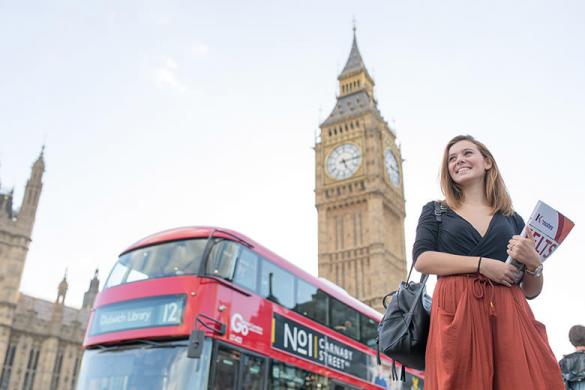Studying in the UK is generally cheaper than studying at equally ranked universities in the United States. Given that degree programs are also often shorter than those at home, students are poised to get the best bang for their buck by pursuing a British education. Tuition fees for UK undergraduate and graduate degrees generally range from 1,283.70-1,888.26 INR. On average, students need between 98.19-120.85INR for living expenses per month of study (depending on if you decide to live inside or outside of London).
Before purchasing anything, people usually research their options to ensure they not only get the best price but also the best “bang for their buck”. Your education should be no different. As you consider the cost of education both in the States and abroad and as you weigh the pros and cons of studying in the UK, don’t forget to factor in value for money. Consider this: The United Kingdom offers the best education money can buy in the English-speaking world.
By studying in the United Kingdom, you get the best for less. Not only could you earn a world-class education, international exposure and experience, and the chance to travel, but also the opportunity to make friends from around the world, all in less time and for less money than at an American university. That is value for money you just can’t beat.
On-campus accommodation for the first year of study is guaranteed to international students who apply by the accommodation deadline.
This guarantee applies to all of Across the Pond’s partner universities. University halls of residence generally cost anywhere from 6,419.03-16,613.96INR per week. Depending on the university, this price could include any or all of the following: an internet connection, gym membership, content insurance, one’s bathroom, and sometimes even a cleaning service! As you research university housing, don’t forget to double-check everything the listed price includes.
In 2020, the average student rent came to £126 per week, or £547 a month, however, students in London can expect to pay an average of £182 a week, or £640 a month. The average annual cost for students is £4,914 (based on a 39-week contract). Most rents include bills of some kind, although one-third of students will pay bills on top of rent.
At the end of atypical three-year undergraduate degree, the expected total cost for accommodation is £14,742. A maintenance loan is available from the government for home and EU students to cover living costs (including accommodation). Students will typically stay in university accommodation for the first year and then move to private housing for the second and third years. University accommodation costs will vary depending on where in the UK the student is based and which kind of accommodation they opt for.
The average weekly food bill in the UK is £50, although this could be lower if you stay in private catered halls. Food bill costs also vary depending on your diet and where you are living in the country. A meal in a pub costs £8 to £12, with a restaurant meal costing about £10 to £25. The average price of a cinema ticket is £7.41, while a Big Mac is £3.39. A pint of beer comes to about £3.67 and a 175ml glass of wine is £4. However, prices in London and cities in the South will be higher than in cities in the North.
Gym membership typically costs about £50 a month but many gyms offer a student discount. A typical night out including travel, drinks, and club or event entry is approximately £30. Gig tickets range from £5 to £45, depending on the venue and acts. It is important to note that in many places you may be able to receive student prices or a student discount, such as at the cinema, theatre, in restaurants and some shops. So be sure to always carry your university student card with you, or explore discount cards and websites for students that may have some good deals.
All students can apply for a National Union of Students (NUS) card, which provides proof of student status and offer discounts of up to 50 percent on technology, food shopping, eating out, going out, media subscriptions, clothes, travel, and university supplies. Some separate cards and programs offer a broader range of discounts, such as UniDAYS and Student Beans.Many banks offer student incentives such as free railcards, Amazon vouchers, and Apple gadgets. Often in university towns, the local establishments will encourage students’ custom by offering discounts.


















































